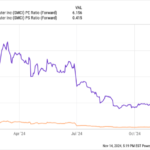Tesla’s stock (NASDAQ: TSLA) faced a tumultuous period recently as the electric vehicle (EV) company reported lackluster second-quarter results coupled with a subdued outlook for the remainder of the year. The consequent sell-off led to a 12% year-to-date decline in the stock value.
Deciphering Weak Automotive Sales
During Q2, Tesla witnessed a modest 2% revenue growth, reaching $25.5 billion. However, adjusted earnings per share (EPS) plummeted by 43% to $0.52, while adjusted EBITDA dropped by 21% to $3.7 billion. The decline was primarily attributed to a surge in operating expenses by 39% and a slight dip in gross margins from 18.2% to 18%.
Automotive revenue took a hit, falling by 7% to $19.9 billion as deliveries of Model 3/Y decreased by 5% to 422,405 vehicles. On the other hand, deliveries of other models, including the Cybertruck, surged by 12% to 21,551 vehicles.
Despite a 14% decline in total vehicle production to 410,831 units, the quarter witnessed a 16% drop in Model 3/Y production and a 24% increase in the production of other models.
Tesla indicated a slowdown in vehicle volume growth compared to 2023, citing a transition between major growth phases. The company also delayed the unveiling of its robotaxi from August to October, with CEO Elon Musk expressing confidence in launching the first ride next year.
While Tesla’s energy generation and storage segment thrived with a revenue doubling to $3 billion, service and other revenue increased by 21% to $2.6 billion.
Evaluating Investment Opportunities
As Tesla’s EV demand stagnates due to consumer apprehension about electric vehicles, particularly regarding pricing, charging infrastructure, and driving ranges, the company shifts its focus towards ventures like robotaxis and the Optimus humanoid robot for future growth.
However, the unproven market and business models for these initiatives pose significant risks. Tesla’s forward price-to-earnings (P/E) ratio, exceeding 63 based on 2025 analyst predictions, reflects an inflated valuation for an EV producer with a maturing auto business and 18% gross margins. Comparatively, traditional automakers like General Motors and Ford trade at under 7 times multiples, signaling the premium Tesla stock commands due to Elon Musk’s reputation and forward vision.
While Musk’s track record of defying skeptics is noteworthy, the uncertainty surrounding untested business models, coupled with formidable competitors like Alphabet’s Waymo in the autonomous driving landscape, caution against investing in Tesla at its current valuation.
Final Verdict on Investing in Tesla
Given the valuation concerns and the plateauing demand for EVs, it may be prudent for investors to observe Tesla from the sidelines. While Musk’s innovation is commendable, the risks associated with the stock’s valuation and market dynamics warrant a cautious approach.





